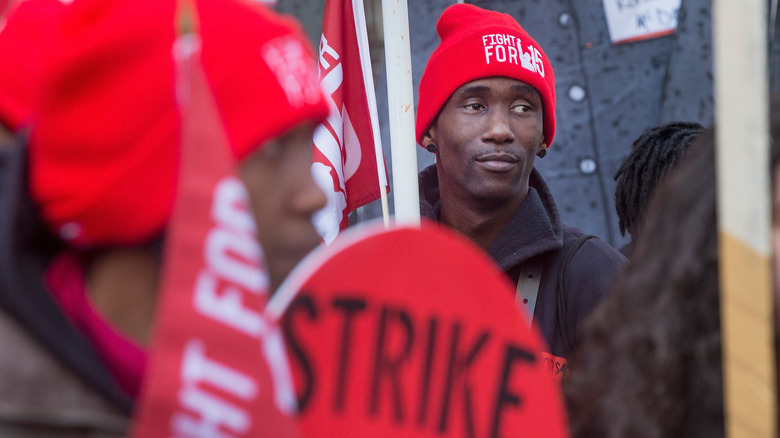Fast Food Workers In LA Are Staging A Walkout Today. Here's Why
Picket lines are growing in Los Angeles. According to Los Angeles Daily News, some Southern California fast food workers will rally in front of the Los Angeles Chamber of Commerce on July 13, 2023. The walkout protests low wages, harassment, workplace violence, and other unsafe working conditions. The non-union cooks and cashiers hope this protest will shine a light on major corporations not listening to employees' demands for better work environments.
Wages are a primary issue for fast food workers. Anneisha Williams, a Jack in the Box employee, told the media outlet, "Some of the people I work with are on the verge of getting evicted, and others are sleeping in their cars."
While Williams received a title promotion, her hourly wage did not increase. Given the current economic issues of inflation, rising food costs, and rent increases, employees cannot make ends meet. The workers believe fast food companies' funds would be better utilized through wage increases rather than campaigns to influence legislative agendas.
In addition to wage concerns, employees seek better working environments and health benefits. Whether unpaid sick leave, on-the-job injury, or improper employee behavior, the incidents have created a scenario where workers feel undervalued and disrespected.
If the fast food worker walkout will make a meaningful impact remains to be seen. Unfortunately, this group joins a long list of workers willing to strike to have their voices heard.
Why are more fast food workers striking?
From California to South Carolina, many fast food workers are taking off their uniforms and heading to the picket line. Both union and non-union workers want consumers to understand that their value meal can come at a high price for the person who assembled it. From wages that might not cover monthly expenses to unsafe working conditions, service with a smile might be hiding a different reality.
Given the state of the economy, more people are frustrated with current pay scales in relation to living costs. Add unruly customers, unsafe working conditions, and other frustrations; hourly workers are tired of being silent.
While California's FAST Recovery Act sought to make hourly wage improvements, the referendum status has put that reform on hold. Starbucks union organizations have not been able to make meaningful changes in their quest. Still, more workers are unwilling to sit idle. Seeing people strike, hearing their voices, and taking some sales away are methods the groups hope will implore corporations to listen to their demands. But restaurants are businesses, and decisions are often measured in dollars and cents. For now, the voices might be growing louder, but it is unclear if people are actually appreciating the words spoken.

